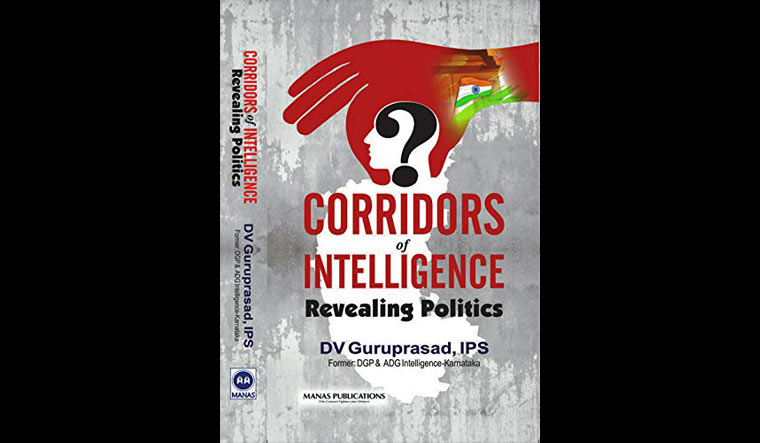A new book by D. V. Guruprasad, a former intelligence chief, documents the difficult dynamics of the 2004 coalition government of the Congress and Janata Dal (Secular). The book, Corridors of Intelligence: Revealing Politics, was launched on Saturday at the Suchitra Film Society in Bengaluru by Guruprasad, who is a former DGP and ADG Intelligence (Karnataka), his colleague Gopal Hosur, former ADGP, and senior journalist Asha Krishnaswamy.
Guruprasad has authored 50 books in Kannada, with this as his fifth book in English. Corridors of Intelligence documents his stint as the intelligence chief, the challenges of Naxalism, the Telgi scam, Dr Rajkumar’s abduction, and of course, the formation of a shaky coalition between two unlikely partners and what transpired during those 20-months of coalition and its aftermath.
In the first Congress-JDS coalition government lead by Dharam Singh, friction between allies led to more time being spent in political management than in governance. A JDS minister would not entertain a request to transfer an official if it was sent by a Congress MLA — and vice versa.
Amid rumours of then deputy chief minister Siddaramaiah (who was in the JDS) joining the Congress Party, Guruprasad came to know from Dr H.C. Mahadevappa, a close confidante of Siddaramaiah, that Deve Gowda had allegedly spoken to Yeddyurappa and was trying to forge an alliance with the BJP. He was also informed that there would be a split in the JDS too. But Dharam Singh could not save his government.
"Kumaraswamy had told me that if Siddaramaiah was inducted into the Congress Party, the coalition government would break up the same day. To my surprise, many Congressmen I spoke to said that Siddaramaiah deserved to be in the Congress party as he was an asset. When I told them it would break the coalition, they welcomed such an event. Despite the understanding between Sonia Gandhi and Deve Gowda, the state Congress leaders were unhappy with the alliance and wanted it to break. In fact, the Congress MPs and legislators felt President's rule was better than facing humiliation in the hands of the JDS," recounts Guruprasad.
The political situation had brought governance to a standstill. The only work being done was the "transfer business," he adds.
Gopal Hosur seconds his former colleague, saying, "Coalition[s] are an apology for good governance. We have seen it in UPA or other coalition governments. Some of the worst governments in Karnataka have been coalitions. While 90 per cent of time is spent on political management, ten per cent is used for governance. It is unfortunate."
The attitudes and aspirations of Congressmen then and now seem to have changed little. 14 years since N. Dharam Singh’s coalition saw unending turmoil and the beginning of an agonising era of coalition politics in Karnataka, a second JDS-Congress coalition is also plagued by the same issues — infighting between multiple power centres within the Congress and an alleged domination of JDS leaders over Congress legislators.
Should an intelligence chief be expected to do political work? Hosur feels that the intelligence department is bound to ensure the safety (law and order) and stability of an elected government.
"I asked myself if Intelligence should involve in political activity. The answer was yes. If there is a likelihood of an unholy conspiracy against an elected government, trying to destabilise it, I need to put in my efforts to expose such plots. But if it is a case of misrule, the intelligence chief should have the courage to advise the chief minister on where the government is going wrong. But that advice should be based on data.”
Intelligence inputs do not change the shape of outcomes, argues Hosur.
Citing an example, he says, "When I gave an input to then Chief Minister Jagadish Shettar that the BJP would win only 40-45 seats in 2013 Assembly polls and the BJP should perhaps have a pre-poll alliance with JDS, Shettar decided against any alliance. Instead he made a mature decision to go it alone perhaps to safeguard BJP's identity. It is a different matter BJP lost power. Similarly, Gundu Rao, who was the chief minister, was alerted by the intelligence about his defeat in Somwarpet and advised to contest from a second seat - Chitapur in Gulbarga. But he withdrew the nomination at Chitapur. He lost from Somwarpet too," he recalls.
A prolific writer, Guruprasad meticulously maintains a diary, and has many subjects to explore as a writer. But, interestingly, he was motivated to write on politics only after reading Sanjay Baru's The Accidental Prime Minister, which captured Dr. Manmohan Singh’s stint of power during UPA I.



